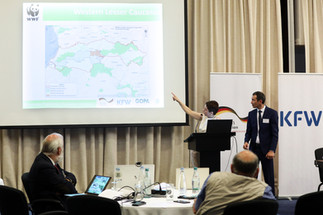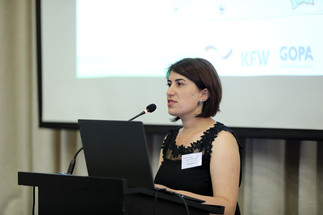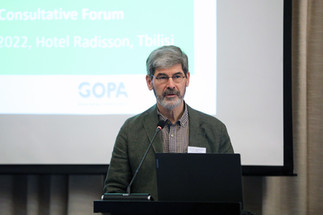NEWS | ECF Phase II - Kick-off Meeting of the Regional Consultative Forum
- Carmen Kuntz
- Jun 9, 2022
- 10 min read
Updated: Oct 31, 2023
The Regional Consultative Forum was a full day of presentations, networking and celebrating ECF I, while officially commencing ECF II.

With over 50 participants, the second phase of the Eco-Corridor Fund (ECF) for the Caucasus was kicked off with the meeting of the Regional Consultative Forum at the Radisson Hotel in Tbilisi on Thursday 9. June 2022. It was a day of high energy and informative presentations. The ECF team welcomed an impressive list of individuals, organisations and institutions to gather for a full day of presentations, networking and celebrating the first phase of the project, while officially commencing the second phase.
New faces and new stakeholders met with those who have been involved in the programme since its first phase. Presentations covered the details, challenges and successes of the first phase of the ECF and an introduction to the objectives and expectations for the second phase. The elements came together to create a launch worthy of this innovative project.
The session was conducted in the four languages of the project: Armenian, Azeri, Georgian and English. As strong communication is an integral pillar of the ECF programme, all participants benefited from real-time translation available via headphones, thanks to a dedicated and skilled group of translators.
One of the most exciting components of the meeting was welcoming new partnerships and support coming from the Swiss and Slovenian governments, and celebrating the renewed support from the German government through KfW, who have supported the ECF since its inception in 2015.
Opening Statement
The forum commenced with a brief but poignant welcome from Giorgi Sanadiradze, the Regional Director WWF Caucasus.
“Today, we will summarise the first phase of the ECF programme, introduce the next phase and most importantly discuss how we will work together.”
- Giorgi Sanadiradze, WWF Caucasus
Statements from countries of South Caucasus
The representatives of the three South Caucasus countries participating in the ECF greeted the participants.
Iuri Nozadze, the Deputy Minister of the Ministry of Agriculture and Environment Protection of Georgia started with an address highlighting the long-term conservation agreements that were signed by the local population in the first phase, and the success of the project related to biodiversity conservation and improving the socio-economic situation of the local population.
“The project has already achieved significant success within the first phase...and has significantly contributed to the creation of an interconnected, unified network of Protected Areas and their effective functioning. We would like to thank the WWF Caucasus Program Office for these results and we are also happily embracing the opportunity to implement the second phase of the project.“
- Iuri Nozadze, Ministry of Environmental Protection and Agriculture of Georgia
Next to the stage was Hakob Matevosyan, the Chief Specialist from the Department of Protected Areas and Biodiversity within the Ministry of the Environment Armenia. He outlined some of the achievements of the first phase of the ECF, including sightings of the celebrated Caucasian leopard, and highlighted the active participation of local communities in ECF, while emphasising the longevity of the project.
“The ECF project has been efficient and will be even more efficient in the future, but more than efficient, it will be sustainable”
- Hakob Matevosyan, Ministry of the Environment Armenia
Firuddin Aliyev, Head of Biodiversity Protection Service from the Ministry of Ecology and Natural Resources of Azerbaijan noted the positive impacts that have been observed in Azerbaijan as a result of the ECF.
“We have seen some big achievements from within the Eco-Corridors project, and I am certain the positive outcomes will continue in the same manner.”
- Firuddin Aliyev, Ministry of Ecology and Natural Resources of Azerbaijan
Statements from the Donors
The next four speakers represented the primary initial donors of the ECF, BMZ and KfW of Germany and the new donors Switzerland and Slovenia
Lidija Christmann, Head of Development Cooperation South Caucasus from the German Embassy in Tbilisi took to the microphone next, discussing how unique and innovative the ECF project is, and how this second phase will build on the success of phase 1, highlighting that the German Government is providing additional funding to support this project.
“ECF support biodiversity conservation beyond political and geographical borders. I am thankful for the successful cooperation with Swiss and Slovenia governments and local governments in Georgia, Armenia and Azerbaijan.” - Lidija Christmann, German Embassy in Tbilisi
KfW have been with the project since its inception and Frank Moerschel, Caucaus Regional Programme Manager brought multiple important points to the floor, identifying the risk taken by the first ECF and how successful it was, noting how many of the communities – from all three countries – who were involved in the first phase, requested more support, prompting KfW and the German government to start a second phase.
“The management of protected areas and setting new protected area – you are quite good at. But what do we do with the areas in between protected areas? This is what the ECF programme addresses.”
- Frank Moerschel, Caucasus Regional Programme Manager with KfW
Next, a representative of one of the project’s new donors, the government of Switzerland, was warmly welcomed. Werner Thut, the Deputy Regional Director of the Swiss Cooperation for the South Caucasus shared the perspective of a new partner, outlining how they got involved and emphasising how this project is different from others.
“Simply speaking, we are trying to combine nature conservation and economic growth and to set up the local populations so they can generate income without destroying natural capital and biodiversity. It’s an exciting moment for us and we are looking forward to future successes.” - Werner Thut, Swiss Cooperation for the South Caucasus
Mojca Kopše, the Director of the Centre for International Cooperation and Development implementing Slovenia’s Development Cooperation spoke next, representing the other new donor and project partnership with the Slovenian Government. She stated the high importance of working together, outlining Slovenia’s existing partnerships within the forestry industry and how she is looking forward to these continued partnerships.
“I was very happy to see the results of the first phase of the project, especially the commitment of the local populations as well as the commitments made by the states. We strive to use our funds on projects that can make a difference which is why we are involved in the ECF.” - Mojca Kopše, Centre for International Cooperation and Development, Slovenia
* * *
Primary Presentations
To commence the longer, primary presentations, Maka Bitsadze from WWF Caucasus delivered a 25-minute presentation introducing the purpose and rationale of the of the ECF in the context of the Caucasus Ecoregional Conservation Plan (ECP) . She used a set of comprehensive slides to explain what the ECP is, how it was created and how it ties directly into the ECF. She reviewed the differences between the initial ECP (2006), revised ECP (2012) and the most recent ECP, released in June 2020, mentioning this was the first presentation since the new ECP was published. She also addressed some of the new challenges the region faces, highlighting the multiple values of ecosystem services and the importance of ecological connectivity in relation to climate change mitigation and biodiversity conservation.
“To protect nature, it needs space. However, the establishment of classic protected areas has its limitations. This is where ecological connectivity and conservation at a landscape level involving local communities becomes essential.” - Maka Bitsadze, WWF Caucasus
Following a short refreshment break, the Chief Technical Advisor of ECF Programme, Jernej Stritih, took the stage, providing an in-depth overview of the ECF programme methodology. He commenced by stating that he was happy that the ECF community is growing in terms of institutions and communities and in terms of donors as well, acknowledging the new support from the Swiss and Slovenian governments.
He then went on to present the innovative eco-corridor approach to biodiversity conservation, and provided details about the background and methodology of the ECF, which included slides and information on the ECF’s application as a financial mechanism by describing the programme’s primary methodologies; Financial Participatory Approach (FPA) and Conservation Agreements (CAs).
“How does ECF as a financial mechanism work? By providing financial support to secure and improve conditions for biodiversity, the socio-economic situation of the local community is improved. To put it simply, you could say that nature is happy and the people are happy. Previously, people approached these as separate topics. Our challenges in the first phase was to combine these two, to create a win win situation.” - Jernej Stritih, ECF Programme
He continued to explain that the objective of increasing biodiversity without affecting income was accomplished by first analysing the landscape and asking, what are the main issues in connectivity in terms of biodiversity. And second, by using the Financial Participatory Approach to mobilise local communities to define their own objectives and look at their own futures.
Achievements of the First Phase of the ECF
Following up on this presentation, three different representatives of community-based organisations (CBOs) took time to present the achievements of the EF Programme so far.
Armenia Representing the Eastern Lesser Caucasus in Armenia, Arus Nersisyan from the community-based organisation (CBO) Arpa Foundation, outlined the region they are working in and the services offered. As one of the first CBOs to sign a conservation agreement, they made it a priority prove that the ECF process can be successful, making the organisation an excellent example of ECF in action.
“We are focused on maintaining biodiversity without impacting the economic viability of the community through long term and short-term activities. This includes anything from implementing anti-poachig measures, updating equipment, improving efficiency of hay meadows.” - Arus Nersisyan, Arpa Foundation CBO, Armenia
Ilkin Yariyev, the Director of the Friends of Nature Gonaghkend CBO spoke next, outlining the accomplishments of the ECF in the Eastern Greater Caucasus in Azerbaijan. He stressed the many positive impacts that the community experienced throughout all stages of participating in the ECF programme, including slides and stories about providing training and education to locals, the optimization of pastures, road improvements, anti-poaching signage and a local lemonade product now for sale. He admitted that community members were doubtful of the programme at first and explained how a series of small competitions (part of the FPA) build trust, further emphasising the effectiveness of the FPA methodology.
“As a community, people started to support our efforts to reduce poaching and protect our areas and we observed a significant increase of the animals in the regions working.” - Ilkin Yariyev, Friends of Nature Gonaghkend CBO, Azerbaijan
Georgia
Discussing the outputs achieved in Georgia, Badri Vashakmadze for Naminauri Village Association CBO presented how they also employed the use of smaller projects aimed to develop a level of trust between the local community and their organisation, starting with an irrigation project which improved the communities water supply.
“As a result of this trust, we broadened the scope of the organisation and started to select territories where we could identify as protected zones, and areas where farming practices and domestic cattle could continue.” - Badri Vashakmadze, Naminauri Village Association CBO, Georgia
The National Forest Agency of Georgia then presented a summary of the Adigeni Sustainable Forestry Project supported by Slovenia. Natia Tskhovrebadze, the Head of the Strategic Planning and Development Service of the National Forestry Agency of Georgia, started by highlighting importance of forests globally and nationally, and provided concrete examples of how the project is working to increase the sustainability of forestry practices.
“We have experienced strong community participation in workshops, and our young rangers were equipped with tools and have been collecting data which contributes to our forest management plan.”
- Natia Tskhovrebadze, National Forestry Agency of Georgia
* * *
ECF Phase II Overview
Following a pause for lunch, Jernej Stritih presented the main elements of the second phase of the ECF programme. He stressed that ECF II would be taking the same approach as ECF I by: focusing locally by increasing the area that ECF covers; working nationally by anchoring community conservation into national legislation; and acting globally by consolidating the ECF approach into a replicable set of tools and methodologies.
His slides illustrated the tangible objectives, outputs and indicators, including (but not limited to), continuing the success of ECF I by developing some 30 new conservation agreements, streamlining the methodology, and further building on the capacities of regional institutions to better support CBOs.
Some of the new elements that ECF II will address include developing formalised Environmental Social Standards (ESS) to be applied to the project through each conservation agreement and more comprehensive monitoring of the impacts of the programme, through documentation like reporting, studies and remote sensing. ECF II will also support improvements in monitoring through the use of the Earth-Beat mobile application and put an emphasis on developing skills for communities to seek out and raise funding from other sources.
“Through the ECF programme, we don’t tell local people what to do, but invited them to contribute; to develop the concepts and manage their own landscapes by providing them with financial incentive to develop good practices, while encouraging them to use local knowledge as well. Once the process starts, then we can exchange information, provide assistance and reinforce these good practices.”
- Jernej Stritih, ECF Programme
Details About Phase II Provided by ECF National Coordinators
Next, the three national coordinators spoke, each providing detailed information on specific topics of the next phase of the programme.
Khayyam Ismayil, the National Coordinator for Azerbaijan outlined some of the new eco-regional corridors that are being considered for the second phase focusing on new regions and connecting corridors. Rusudan Chochua, the National Coordinator for Georgia discussed the integration of the environmental and social standards in the ECF methodology, including the application of grievance mechanisms and the importance of transparency. And Armen Shahbazyan, the National Coordinator for Armenia provided an information-packed presentation on the Financial Participatory Approach and strengthening local communities, where he discussed community mobilisation and the importance of ownership and traditional knowledge.
“The vision of the ECF project is balancing the natural and anthropogenic perspectives. There is no separation of the community and the land. In order for locals to buy into conservation ideas and use these ideas, they have to own the ideas – they have to generate the ideas.”
- Armen Shahbazyan, ECF National Coordinator for Armenia
The next presenter, Mkrtich Ayvazyan, the Chairman of Strategic Development Agency (SDA) NGO, discussed the Swiss-supported project, Living Landscapes for Market Development in Armenia. He brought some interesting new ideas forward, primarily discussing the contemporary conflict between nature conservation and economic welfare and how nature-based value chains can be used to overcome this challenge.
“When we place an emphasis of slow tourism – when individuals come into the village and stay instead of masses of people coming in on a bus, standing on the highway and then leaving – through this, we see that there are so many opportunities for local communities.” - Mkrtich Ayvazyan, Strategic Development Agency NGO
* * *
Feedback, Discussion and Closing Remarks
Following a short afternoon coffee break, the forum resumed for the final segment, which included an opportunity for feedback and discussion which flowed organically and centred around sustainable tourism and the challenges the regions face, or will face, as the ECF processes bring increased income and tourism to communities.
Providing closing remarks, Giorgi Sanadiradze expressed the unanimous excitement about phase two of the ECF Programme with some final words.
“For us the ECF is a key instrument. It is centred around the integration of the landscapes, large scale biodiversity conservation and unites these efforts across borders. We are looking ahead to Phase II of the ECF, and are happy to welcome the new donors, who bring new ideas, knowledge and new values to the ECF programme.” - Giorgi Sanadiradze, WWF Caucasus
To echo the words of Mr. Sanadiradze, the Eco-Corridors team would like to thank all participants for a very dynamic and engaging meeting and to once again acknowledge the support of our primary donors; the German, Swiss and Slovenian governments. The next months promise to be very exciting, innovative and active as the Eco-Corridors Fund Programme Phases II takes shape.
















































































































